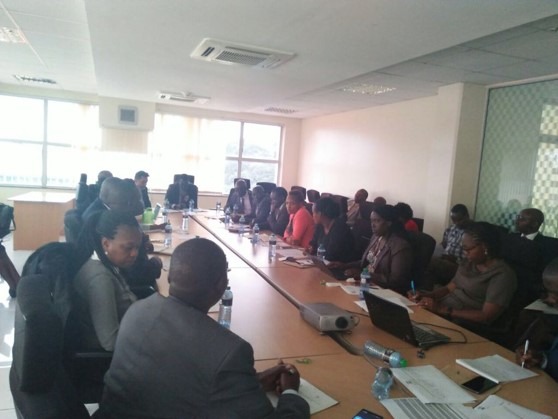Kenya Healthcare Federation (KHF) holds the first Ministerial Stakeholders Forum (MSF) for the year 2018 with newly appointed Principal Secretary Mr Peter Tum
Principal Secretary (PS) for Health Kenya, Mr Peter K. Tum hosted his first Ministerial Stakeholders Forum (MSF) on 17th April 2018 at Afya Annex. The Forum which was co-chaired by Dr. Amit N. Thakker, Chairman of Kenya Healthcare Federation was well attended by Ministry of Health (MOH) officials, KHF Directors, KHF Committee Chairs, Faith Based Organizations (FBOs), Non-Governmental Organizations and Kenya Private Sector Alliance (KEPSA) coordinators.
The PS, in his opening remarks, acknowledged that engagement with the private sector is important due to the critical role it plays in all areas of Health, most importantly; policy development, supply chain of Health Commodities, Service Delivery in terms of facilities, Employment of Health workers, Patient Management , use of Technology, Research and Specialized Training. He noted that only by synergising the Public and Private Sector can we achieve Universal Healthcare Coverage (UHC).
Dr. Thakker, extended his appreciation to the Ministry of Health for recognising the role of the private sector as the engine of growth and creating an enabling environment. These conditions have led to significant growth of the private sector in Kenya that currently caters for half the health work force as well as 50% of the current facilities in Kenya. The current contribution to Gross Domestic Product (GDP) is slightly over 2.3%, which is well above the Sub-Saharan African Countries average of 1.7%.
Mr Stephen Macharia – Public Private Partnership (PPP Unit – MOH) gave a presentation that highlighted the key issues discussed in previous MSF meetings. He identified the significance of the private sector as it has the highest number of healthcare facilities contributing to 54%. In addition, he pointed out that there is need to focus on the lower income level of the population that are not covered by health insurance. There is therefore a huge market for the Private Health Insurance.


There were Seven emerging issues identified among the private sector as; Health Regulations, Healthcare Financing, Supply Chain, E-Health and Technology, Public Private Partnerships, Human Resources and Quality & Standards.
Dr Amit Thakker addressed the first issue as Health Regulations, where He offered KHF inclusion in the Health Act implementation committees and stressed the need to have a neutral regulatory body (Health Benefits Regulatory Authority),that will govern both the Private and Public financing Institutions as we embark on accelerating Coverage for Universal Healthcare (UHC).
Mr Isaac Nzyoka (Chair – KHF Healthcare Financing Committee) expressed support of the government’s agenda on UHC. In his presentation, he stated that there is need to strengthen the role of the private sector in terms of Health Care financing because it has a lot to offer. Private Insurers have over 200 financial distribution centres in the country that can be very useful. He noted that one of the biggest challenges in UHC is reaching the entire population. The Private Sector can achieve this through technology that can enroll members and manage overall process efficiency.
Dr Louis Machogu – Vice Chair KHF Supply Chain Committee, emphasized that the cost of care needs to be reduced and we can do so by promoting local manufacturers of medicine through appropriate incentives. Both sectors need to come together to utilize the 5000 registered private sector pharmacists to negotiate lower costs. VAT on medical devices are calculated on the patient bill and this ought to be reversed. Regulations need to be strengthened for control on parallel imports and influx of substandard products.
Ms. Daniella Munene (Member KHF e-Health Committee) spoke on E-health and Technology where She requested that the harmonized coding system at National Hospital and Insurance Fund (NHIF) be shared with the private sector which will result into a rich Data and innovation between the two sectors if they work together.
Ms. Joyce Wanderi – KHF Director & a member of KHF – PPP Committee proposed that the Public and Private Sector should organize a retreat to prioritize what the various pillars should be focusing on towards scaling up PPPs. She suggested greater transparency in the procurement process as well as looking at strengthening the PPP unit at MOH.
Mr. Ken Auma – Chair KHF Human Resource for Health Committee (HRH) Committee, Enlightened the members on the Multi Stakeholder Partnership (MSP) initiative under taken by KHF in regard to the 3 health cadres that need support which can play a role in UHC. He proposed that a unified curriculum be put in place for the 3 cadres and incentives be given to assist KMTC in the training process.
Anthony Jaccodul Vice – Chair KHF Quality & Standards Committee presented on quality and standards where He stressed on the need to include the Private Sector in the process of making Kenya Quality Model for Health (KQMH) the minimum standards certifying tool in Kenya as well as introducing a harmonized national coding system to enable data share.
Ms. Pauline Irungu, Vice Chair – Health NGOs Network (HENNET) emphasised that UHC needs to feature Quality of Care much more prominently.
Dr. Sam Mwenda, Chair – Christian Health Association of Kenya (CHAK) reiterated that Kenyans need to be empowered to access facilities that they have not been able to, this will enhance the change.
The meeting was very productive with the hope of good collaboration in the Health sector towards achieving quality and affordable healthcare for all Kenyans.
